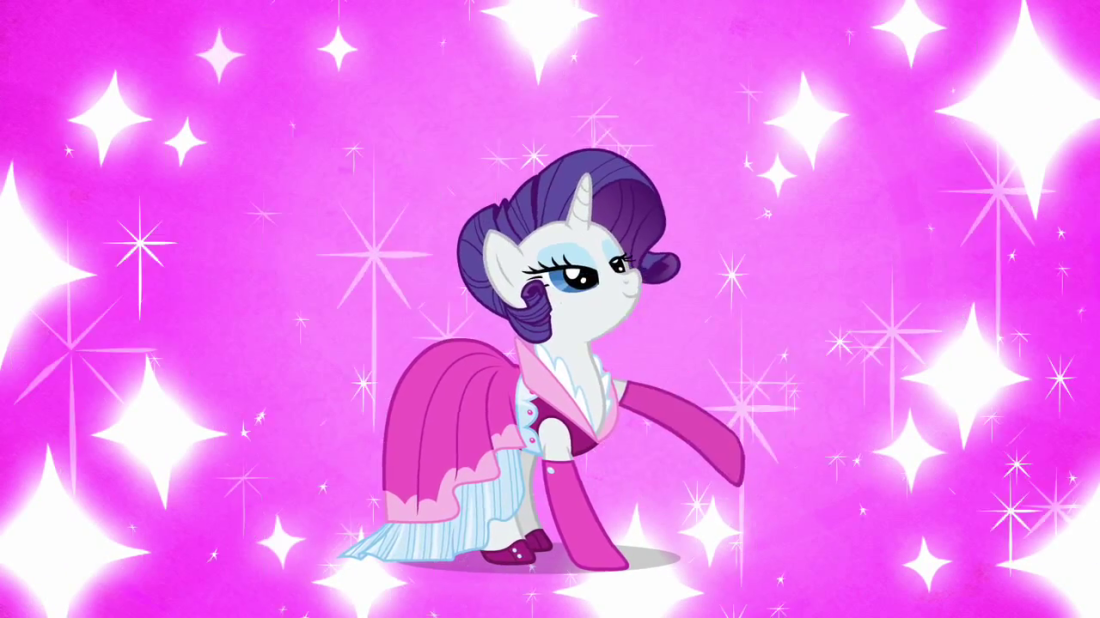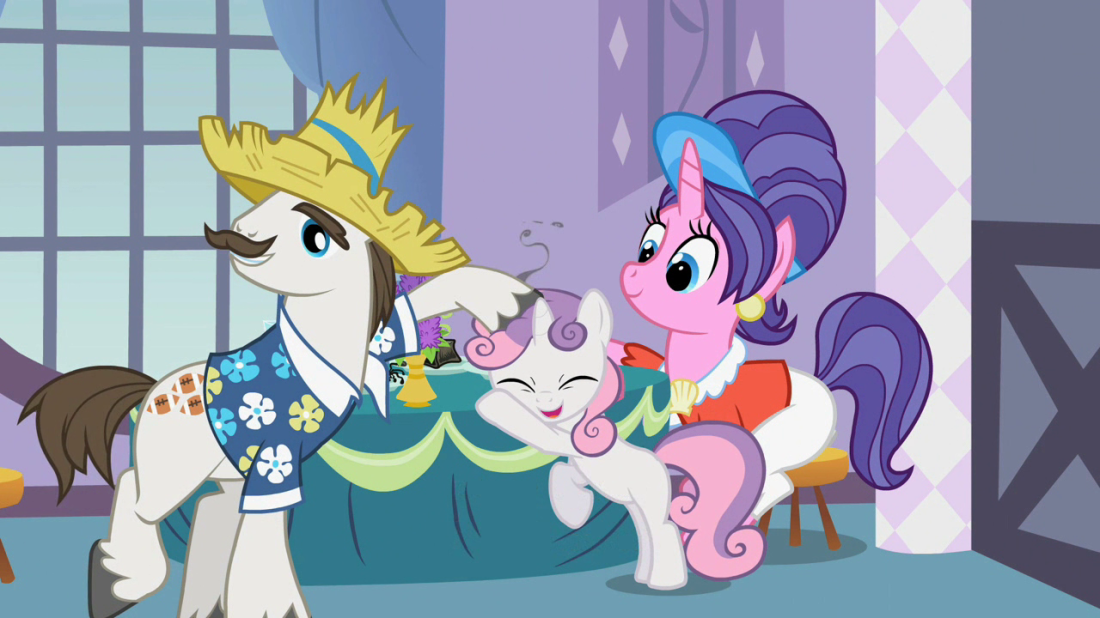I fully realized/accepted during BronyCon 2016 that Rarity is my favorite pony.

Technically, I more or less knew this last year and it should be obvious given that I spent a good five minutes talking about her in my 2015 panel. However, I still maintained that I didn’t really have a favorite pony.
At first, this choice seems a bit strange. After all, I’m not particularly feminine in my daily life nor do I aspire to be. I’m not a seamstress. I don’t care about the latest fashion trends. I don’t have a posh accent.
No, I’m nothing like Rarity unless perhaps we’re talking about generosity and loyalty to friends.
So how the hecky is she my favorite pony? Those who know me best would expect Applejack or Rainbow Dash or Twilight Sparkle to be my pick because I’m more like them than any of the others.
But for me, this turned out not to be about who I most identify with, but rather who is the hardest to love and who helps me unlearn internalized misogyny. The answer is Rarity.
According to survey results from the Brony Study team in 2014, Rarity is in last place as a fan favorite. I understand why. Her character design screams femme fatale and she certainly has her moments of being utterly insufferable.
I mean, I think she’s adorable and charming, but I digress.
Growing up, I dissociated myself from anything extremely feminine whenever I had the choice and whenever I wasn’t trying to be semi-attractive in a vain attempt to have my life follow the promises of compulsory heterosexuality. I thought Barbies were cool for a second, but most of the time I hated them and instead chose to play with Legos, Pokemon, dinosaurs, race cars, and stuffed animals. I created epics where any female characters who were like Rarity were villains, homewreckers, or stupid because that’s the message I internalized early on.
I hated girly things. Hated them. I knew that I wasn’t stupid or rude or bad, so I didn’t want to look like someone who was. When it came to the dichotomy between girl next door and femme fatale, I wanted to be on the protagonist’s side.
As I got older, I started adopting some aspects of traditional femininity because I chilled out a bit and because I really, truly believed that my life would become the youth group dream: meeting a nice, Christian man and having 2.5 kids raised in a strong, Christian home.
That dream unraveled in many ways, but stayed the same in some others. I’m not gonna get into that now. The point is that feminine expression became something that I just grew used to and accepted as something I just had to do eventually. A lot of it wasn’t so bad when I tried it.
But I don’t think I ever dealt with that internalized hatred against all things feminine.
Then along came My Little Pony, which my childhood self would never have touched with a ten foot pole. All it took was my roommate showing me the first episode of the pilot and I was hooked. This show had a story! It reminded me of Sailor Moon!
And it had a squad member who was extremely girly.

However, I realized that Rarity carries herself differently than most characters like her. In fact, everything about Rarity is nuanced and it’s easy to miss those nuances if we dismiss her too quickly.
In the season 1 pilot, Rarity is confirmed as the element of generosity when she gives Steven Magnet her tail to replace the side of his mustache that had been torn off. At first glance, this seems like a pretty weak way to show generosity since it’s so grounded in fretting over outward appearance. However, I don’t think Rarity or Steven Magnet’s particularities about their appearance comes from being insecure or having self-esteem issues. Instead, I see their particularities as specific expressions of identities that they are quite comfortable with. Rarity knows who she is as an artist and an individual. Her fabulousness on the outside is an outpouring of the fabulousness on the inside. She gets upset when her mane isn’t coiffed because the outer self is not accurately representing the inner self.
How do we know that Rarity has such a strong sense of self and that the dresses and makeup are not impermanent ways of creating self-confidence where none exists?
Well, I think the answer is that Rarity is posh despite her family.

Neither her parents nor Sweetie Belle are as flamboyant in their dress or mannerisms as Rarity is. The family isn’t at the top of Equestrian society nor do any of them show signs of wanting that life, so where did Rarity get it from? Perhaps she’s rebelling against an uncouth and mediocre upbringing. This could be why she and Applejack clash so much at first. Yet to distinguish oneself so much from one’s family suggests a powerful and secure sense of identity.
So I think Rarity very much knows who she is and she has very specific ways of declaring that to the world. This doesn’t mean that she never struggles with confidence issues–look at that whole Trenderhoof thing.
What’s refreshing about that episode, at least, is that the “desirable” version of femininity is the practical, worker type that Applejack exhibits. Many other times, when a girl in the TV show or movie is changing how she looks to impress a boy, she does so by becoming more traditionally feminine. Rarity tries (terribly) to become the opposite of herself for someone besides herself. That is among many reasons why her attempts are so laughably bad. Another is that her self as a fashionista is too strong to be contained. That inner fabulousness will always exert itself.
That inner fabulousness may also be why Rarity does things like choose the perfect hat for a stranger without being asked. On one level, it could be an intrusion (no one asked you, Rarity!). On another, it could be that Rarity perceives and inner fabulousness in everyone and constantly looks for ways to bring that out. Sometimes this works and sometimes it doesn’t. Sometimes she gets too caught up in playing by the rules of Equestrian high society (or helping others to play by those rules) that she forgets to focus on inner fabulousness.
Maybe all of this only makes sense to me, but that’s okay. I’m still not that feminine in my gender expression and probably won’t be for a lot of reasons (unless it’s 100 degrees outside or I’m in a wedding party), but I love this idea of not being particularly feminine myself and yet loving a very feminine character. It compels me to reject the tendency to roll my eyes and dismiss those girly girls.